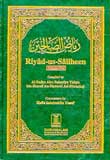Riyad Us-Saliheen (Gardens of the Righteous)

Chapter 199
Sunnah of Zuhr Prayer
1113. Ibn `Umar (May Allah be pleased with them) reported: I performed with the Messenger of Allah (PBUH) two Rak`ah before and two after Zuhr prayers.
[Al-Bukhari and Muslim].
Commentary: This Hadith has already been mentioned. See Commentary on Hadith No. 1098.
1114. `Aishah (May Allah be pleased with her) reported: The Prophet (PBUH) never omitted four Rak`ah supererogatory prayer before Zuhr prayers.
[Al-Bukhari].
Commentary: Some Ahadith state that he (PBUH) used to perform two Rak`ah before and two after Zuhr prayer. The present Hadith says that he used to perform four Rak`ah before Zuhr prayer. Both narrations are correct and can be followed according to conditions and circumstances.
1115. `Aishah (May Allah be pleased with her) reported: Whenever the Prophet (PBUH) stayed in my house, he would perform four Rak`ah (supererogatory prayer) before Zuhr prayer. Then he would go out and lead Salat. He (PBUH) would then come back and perform two Rak`ah (supererogatory prayer). He would lead the Maghrib prayer and come back and perform two Rak`ah (supererogatory prayer). When he (PBUH) had led the `Isha' prayer, he would enter the house and perform two Rak`ah (supererogatory prayer).
[Muslim]
1116. Umm Habibah (May Allah be pleased with her) reported: The Messenger of Allah (PBUH) said, "Whoever observes the practice of performing four Rak`ah before Zuhr prayer and four after the Zuhr prayer, Allah will shield him against the Fire (of Hell).
[Abu Dawud and At-Tirmidhi].
Commentary: This Ahadith mean that a person who follows this course of practice, will die as a Muslim and will not remain in Hell for ever like the Kuffar (infidels) unless Allah has forgiven all his sins for him and would, as a result, save him from Fire altogether. That is, Almighty Allah will not let him live in Hell for ever. According to some Ahadith, the fire of Hell will not touch him, which also amounts to saying that he will not be kept in Hell for all eternity. If a Muslim is liable to punishment, his stay in Hell - for a few days or weeks or months depending on the nature of his sins - is not a contravention of such Ahadith because he will ultimately be released from Hell and brought to Jannah. "Allah will shield him against the Fire'' should not be taken to mean that a Muslim will not be sent to Hell no matter what he does. If Almighty Allah does not forgive him in the very first instance, he will have to suffer the torment of Hell as long as He would like and then he will be sent to Jannah.
1117. `Abdullah bin As-Sa'ib (May Allah be pleased with him) reported: The Messenger of Allah (PBUH) used to perform four Rak`ah prayer after the declining of the sun before Zuhr prayer and would say, "This is an hour at which the gates of heaven are opened, and I like that my good deeds should rise to heaven at that time.''
[At-Tirmidhi].
Commentary: The Prophet (PBUH) used to perform the four Rak`ah Sunnah of Zuhr prayer when the sun started declining. In fact, except for `Isha' prayer, he would perform every Salat at its early hours.
The phrase "the gates of heaven are opened'' to means that the good deeds that people do are lifted to heavens at that time.
1118. `Aishah (May Allah be pleased with her) reported: If the Prophet (PBUH) could not perform four Rak`ah before Zuhr prayer, he would perform them after it (i.e., after the obligatory prayer).
[At-Tirmidhi].
Commentary: This Hadith tells us about the preparation which the Prophet (PBUH) used to make for performing the Sunnah. Every Muslim should, therefore, make full preparation for performing Sunnah. If one is unable to perform it before the Fard prayer, then one must do it afterwards.
